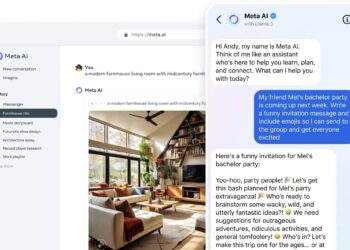Meta has introduced a brand new AI button in WhatsApp chats, providing a fast way to engage with its AI assistant. While this may seem beneficial at first glance, there are several reasons I find this addition less than appealing.
5
It Clutters the WhatsApp Interface

WhatsApp has always been known for its clean and straightforward design: just you, your conversations, and a few easy-to-navigate tabs. This simplicity added to its appeal, especially when compared to more complex messaging platforms like Telegram. However, with the new Meta AI button, the space feels notably busier.
On both Android and iOS, the Meta AI icon stands out with its bright blue hue, drawing attention. It’s quite eye-catching, and if you’re not interested in utilizing AI, it appears to be an unwelcome distraction that disrupts the app’s flow.
While one additional button might not seem like a significant concern, it adds to the overall clutter. With each new feature that Meta integrates, WhatsApp moves further away from the minimal messaging app many of us initially fell in love with.
4
I Can’t Remove It, Even If I Don’t Want It


What frustrates me the most is the inability to remove the Meta AI button from WhatsApp, even if I have no intention of using it.
Currently, there is no official option to hide, disable, or eliminate this feature. The button remains in the app regardless of whether you welcome it. While you can choose to ignore it, the presence of this button still occupies space in an application that used to prioritize simplicity.
I’m open to using AI tools, but when something is integrated into my personal messaging application without a clear opt-out option, it feels less like a welcomed feature and more like an unavoidable fixture—and not a pleasant one at that.
3
It Blurs the Lines Between Human Conversations and Bot Interactions
One of WhatsApp’s greatest strengths has always been its focus on real human communication. You open the app, connect with family, friends, or work groups—that’s the essence of it. However, the addition of Meta AI starts to dilute that clarity.
You can now tag @Meta AI in group chats just like you would with a friend. It even shows up in your contact list, which could easily confuse someone who isn’t paying attention. Although Meta has made efforts to distinguish AI interactions, the reality is: bots are now part of conversations in a way they weren’t before.
That raises some questions. Will future updates push Meta AI even deeper into regular conversations? Will it begin suggesting replies or surfacing information without prompt? Although the integration may seem like a minor change now, it paves the way for a potentially intrusive and blended experience in the future.
Meta assures that your private WhatsApp messages remain secure through end-to-end encryption and that Meta AI cannot access them unless prompted by your direct interaction. While that’s reassuring, it does not eliminate data collection risks.
If you communicate with Meta AI on WhatsApp, your prompts can be used to enhance its models. This includes any queries you type while seeking answers or generating content. Even if the data is anonymized, it’s still being recorded, analyzed, and utilized to develop Meta AI further. You can reset your AI data, but that doesn’t stop upcoming data collection if you continue to engage with it.
I’m skeptical about features that push me to share more of my habits, preferences, or thoughts—especially from a company that’s already privy to a plethora of my information. I don’t want my casual inquiries or writing efforts to contribute to a larger data ecosystem.
With so many AI tools available today—like ChatGPT, Claude, Gemini, and countless others—what sets them apart is the choice I have over when and how to use them. If I want assistance drafting an email, brainstorming ideas, or fact-checking something, I engage with those tools on my own terms. They don’t insert themselves into the apps I typically use for private discussions.
That’s what bothers me about Meta AI in WhatsApp. It’s not just its existence; it feels like a disruption in a space where people expect confidential and secure communication, and we’re now expected to adapt.
I’m not opposed to AI; I simply prefer tools where I have a choice, with clearer controls and boundaries. Tools that aren’t integrated into messaging platforms I depend on for real-life conversations.
While Meta AI might be a compelling feature for some, I find it overly intrusive for an application meant for personal communication. Fortunately, there are plenty of other AI tools that allow me to choose how and when I engage with them. Until Meta provides me with more control, I’ll continue using the features I already love in WhatsApp.





